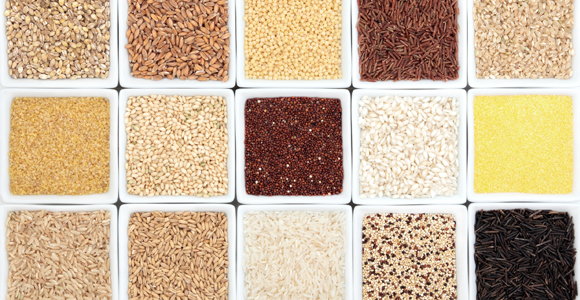Your diet is made up of three macronutrients: carbohydrates, protein and fat. Carbohydrates are present in varying amounts in most of the foods you eat including fruits, vegetables, grains, beans, legumes, milk and milk products, and foods containing added sugar such as candy, soda and other sweets. Carbohydrates are present in food in the form of starch, sugar and fiber. A carbohydrate is a molecule containing carbon, oxygen and hydrogen, and can be either simple or complex. Both simple and complex carbohydrates can be healthy food options. Simple carbohydrates are monosaccharides and disaccharides. Monosaccharides are a single sugar molecule, while disaccharides are two simple sugar molecules linked together. More complex carbohydrates are called polysaccharides and are multiple sugar molecules linked together.
The Institute of Medicine sets The Dietary Reference Intake for carbohydrates as 45 to 65 percent of your daily calories. It also sets the Recommended Dietary Allowance for fiber, a type of carbohydrate that is not digested, as 38 grams per day for adult men and 25 grams per day for adult women until age 50, when it decreases to 30 and 21 grams per day, respectively. However, you may decide to eat more fiber, as the IOM states that a high-fiber diet is part of an overall healthy diet for most people and that there have been no serious adverse effects produced from eating a diet higher in fiber.
Carbohydrates provide you with most of your energy, as they make up around half of your daily calorie intake and are converted into blood glucose or blood sugar by your body to be used for energy. According to the American Diabetes Association, both the amount and type of carbohydrates you consume affects your blood sugar levels and so it is important to choose healthy carbohydrate choices and control your portion sizes. Foods that contain nutrients such as fiber, vitamins, minerals, antioxidants, protein and healthy fats tend to be better choices than those which are considered empty calorie foods because they only provide calories with little or no other nutrients.
Choose whole-grains rather than refined grains because whole-grains contain the bran and germ of the grain (where most of the fiber and other important nutrients such as essential healthy fats, vitamin E and B vitamins are). Refined white grains such as white rice and white bread have had this portion of the grain removed during processing. Fruits, vegetables, beans, legumes, nuts and seeds are other good sources of fiber and have varying carbohydrate content.
Natural sugar is the main carbohydrate content in fruit and milk and milk products. Natural sugar is a better choice than added sugar which is present in other sweet carbohydrate foods such as cookies, pies, cakes, candy and soda. It is a good idea to have a piece of fresh fruit when you crave something sweet, as foods high in added sugar usually do not contain the fiber, vitamins, minerals and antioxidants present in fruits. You may also decide to have a glass of milk or a yogurt for dessert, as milk and milk products tend to be a good source of protein, vitamins and minerals in comparison with foods containing added sugar.

Jamie Yacoub, M.P.H., R.D. is a clinical dietitian with a Master's of Public Health in Nutrition. She obtained her Bachelor of Science in clinical nutrition from UC Davis after four years, during which time she participated in internships in several different nutrition environments including Kaiser Permanente and Women, Infants, & Children (W.I.C.). After graduating from UC Davis, she went on to study public health nutrition at Loma Linda University where she obtained her Master's of Public Health in Nutrition. Jamie completed the community nutrition portion of her dietetic internship as an intern for a Certified Specialist in Sports Nutrition. She completed both the food service and clinical portions of her dietetic internship at a top 100 hospital in the nation, where she was hired as the only clinical dietitian shortly after. Jamie now works as an outpatient clinical dietitian and is an expert in Medical Nutrition Therapy (M.N.T.) using the Nutrition Care Process (N.C.P.) including past medical history and current laboratory values as a basis of nutrition assessment.



